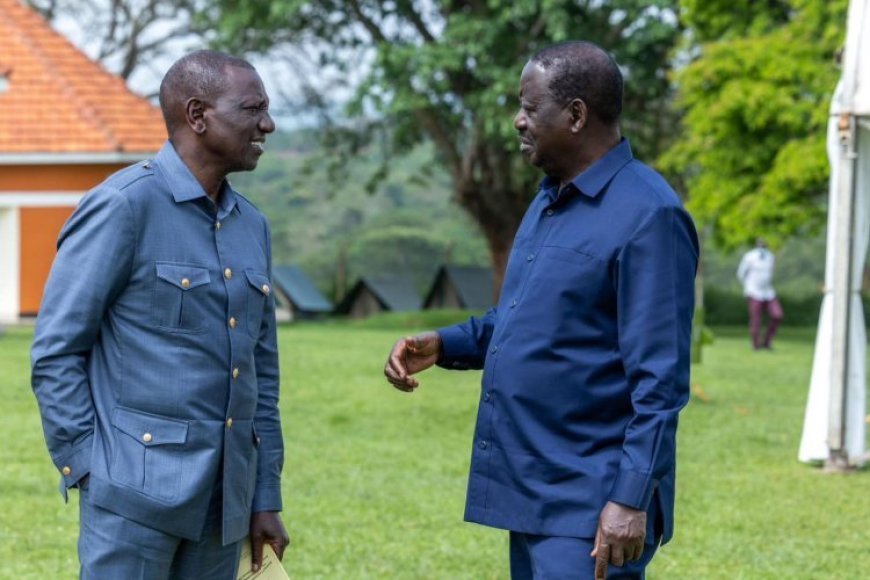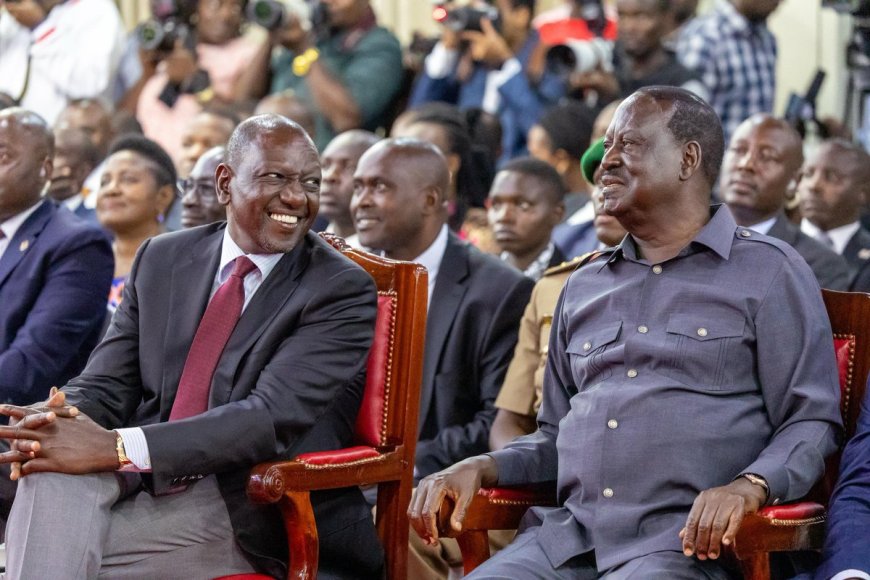Will Raila Dump Ruto In 2027? Kenyans Respond In New TIFA Poll
This is according to a survey published on Wednesday, May 28, by Trends and Insights for Africa (TIFA)

Former Prime Minister Raila Odinga's relationship with President William Ruto will be a short-term affair, with many Kenyans predicting the Orange Democratic Movement (ODM) abandoning the Head of State ahead of the 2027 general elections.
This is according to a survey published on Wednesday, May 28, by Trends and Insights for Africa (TIFA), whereby 28 per cent of Kenyans said they believe Raila will return to the opposition and run for president again.
Another 18 per cent expect him to rejoin the opposition but back a different presidential candidate instead. However, just 23 per cent think the ODM leader will support President Ruto’s reelection bid, while 14 per cent believe Raila will choose to retire and sit out the next General Election entirely.

Raila Odinga speaking on March 26, 2025, in Wiiru, Maara in Tharaka-Nithi County during the burial of Mzee Julius Laban Murungi. father to Betty Murungi and father-in-law to Governor James Orengo. /RAILA ODINGA
"Almost a majority of all Kenyans expect him to rejoin the opposition, whether he contests himself (28%) or supports another candidate against Ruto (18% - making a total of 46%)," read the report in part.
According to the report, over a third of those who currently support the broad-based government believe Raila will break away from the alliance and return to the opposition—25% think he’ll run for president himself, while 13% expect him to back a rival candidate.
Among those opposed to the broad-based government, just over half predict that by 2027, Raila will have rejoined the opposition—31% believe he’ll launch his own bid, and 22% think he’ll support someone else.
"Indeed, even more than one-third of Broad Based Government (BBG) supporters expect that he will have turned his back on the current BBG arrangement by rejoining the opposition, whether he contests or not (13% + 25% = 38%). For their part, only slightly more than half of those opposed to the BBG believe he will have rejoined the Opposition by 2027, whether or not he actually contests the presidency yet again (22% + 31% = 53%)," added the report.
In August 2024, Raila announced that he had “donated some of his experts” to President Ruto following the president’s decision to dissolve his cabinet in the wake of violent anti-finance bill protests.
As a result, several of Raila’s allies—John Mbadi (Treasury), Wycliffe Oparanya (Co-operatives), Ali Hassan Joho (Mining), Opiyo Wandayi (Energy), and Beatrice Askul (EAC & ASALs)—were appointed as cabinet secretaries in Ruto’s government.
In exchange, Ruto publicly backed Raila’s bid for the African Union Commission (AUC) Chairmanship and committed significant resources to support the campaign. However, Raila ultimately lost the election in February.
Despite the setback, Ruto and Raila formalised their cooperation through a Memorandum of Understanding (MoU), outlining a working alliance between the United Democratic Alliance (UDA) and the Orange Democratic Movement (ODM).
Meanwhile, TIFA examined Kenyans' views on the broad-based government, with 54 per cent of them expressing their opposition towards it.
Whereas 22 per cent of them stated otherwise, 25 per cent of Kenyans confessed that they do not have an opinion on the matter.
"Across the country, support for the BBG is highest in the President’s home zone of the Central Rift (37%) and lowest in the Mt. Kenya and the Lower Eastern zones, the home areas of his former/impeached DP Rigathi Gachagua and Azimio/ODM leader Kalonzo Musyoka, respectively (13% and 12%)," read the research in part.
"Evidently, a reflection of former Prime Minister Odinga’s now-cordial relations with the Kenya Kwanza government and the presence of several senior ODM figures within it, residents of Nyanza give the BBG its third-highest level of support in regional terms."







